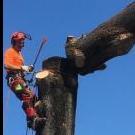
Po!la*d-a four letter word?
One could be forgiven for thinking it is! I am almost afraid to mention the word in today’s arboricultural scene, but am I the only one who thinks it a little ironic that we now revere the very trees that where pruned in such a way we might now lynch those doing it? Is pollarding really to be considered the ultimate sin? Or is there just a lack of insight into the merits and de merits of each case, and a fear of retribution for going out on a limb and making the choice. At this time it’s a brave man that suggests “sensitive pruning” isn’t always the right approach. As a climber of 20 odd years I have done my fair share of old and veteran trees, and had to pollard (oops, blasphemy!) some for spurious reasons, not having been the one responsible for the job specification. If there is one thing I have gained through my successes and failures it is insight, a “feel” for the tree and its life from seed to senescence, its grace and ultimate glory as a grandfather of time.
Thanks to the likes of Neville Fay and Ted green MBE the arb world is more enlightened on the whole subject of ancient trees and veteranisation, and the world seems to be awakening to a new understanding. We have come almost full circle, we grew a distain for harsh techniques and Hepting/ Shigo and others exposed the issues with poor pruning and treatments. A refined approach was born and some of us went on to become masters of the art in fine tip reductions in respect of this new knowledge. We stopped over lifting tree canopies and crucified the “over thinners” we mobbed the “purveyor’s of pollard”. While all this was going on a few of us “labourers” where reading up and taking notes, watching the debates and doing what we where told was the “best practice”.
“I’m not suggesting we abandon this approach, preservation of amenity is a different game altogether”
Now it is our turn to give some input to the debate, and I am certain there will be many “old school” climbers ready to join in. The one thing that is blindingly obvious to me is that very little respect is paid to the “experience factor” it is all well and good educating yourself and gaining a degree in arboriculture, but you can never learn from books what you learn by feel; and trees, though they may be the substance (paper) of text books, rarely are trees text book in nature. I mean no disrespect to the “consultants” but you really should pay more heed to the views and experience of climbers. The older climbers have a body of experience gained from a time when we just got on with it, rounding over, pollarding etc. We might never consider doing it these days but we know HOW to do it and how to do it well, skills that are being lost on a generation of climbers who only know the way it is today.
What this will mean in a decade or two is that people with the very skills the veteran brigade seek to re learn will be lost, how hard can you prune? Where can we make that cut for the best compromise of vascular support and minimal dysfunction? Have we not learnt just how resilient trees can be? Decay and dysfunction are part and parcel of a trees old age, be that from natural progressive infections or via pruning wounds, they are the same end result so why fear them? I am sick to my teeth of being told I can not do this and I can not do that, when I have all my life proven time and time again that it CAN be done, but it has to be with “insight” I fear if we don’t settle the debate soon a whole gap will appear in the generations of veterans as the old ones die while we are all trying to “rediscover” the old ways. The Japanese have been “veteranising” for a thousand years, albeit on a different scale, the principles are the same. The art of producing a miniature ancient tree of visual stature and form is the same art required to recreate the ancient pollards and veterans of the medieval era. You just have to think BIG.
I have seen some ridiculous attempts at re creating the pollard, and some pretty dire attempts at recession pruning, so bad in fact I doubt Mr X in his white transit with traces of tarmac could do a worse job! I can no longer remain silent walking the old deer parks and seeing trees unmulched unfenced and unloved, they are as much a part of our green and pleasant lands history as any building or monument yet they are left to fend for themselves much of the time despite all the current knowledge available. We need to re-evaluate the pollard fast and to think of pollarding as an option for those old trees considered for felling due to various defects, infections or even subsidence issues. I do not mean the way its done on LA budgets either for those thinking along those lines!
Some people in the field are of the opinion that pollarding was carried out when the tree was young and while this may be true in today’s scene, it was certainly not the case in the medieval period or Tudor period. I am well aware that there exist few records of the pollarding of old. However the tree is a record of its life, it tells us like a book of a thousand pages what events took place in its life, and when. One only has to look at those old pollards of Burnham to see that pollarding was a brutal practice; the evidence is in the hollow centres. We only have to look at compartmentalisation to see how large the tree was when it was Pollarded. The now hollow stems are the new wood that formed over the dysfunctional core. While the living cambium continued to grow over the now dead part, the demons of D, death, decay and dysfunction (Shigo), moved in and had a tasty supper of lignin and/or cellulose.
I think there was two ways possibly three of pollarding, and certain that Arborist’s of the time much like the good ones today had a “feel” for their art. I am certain that a tree that had previously been un-pollarded would have had the two major lower limbs left on and been decapitated above this point. This guaranteed that the tree would continue to grow and survive the loss of its head, like the “monarchs without head” a form that is made perfectly naturally. We have to realise that in those times text books where the preserve of the wealthy, these where craftsman whose skills where passed on to a new generation of apprentices. They also had the luxury of more trees to make mistakes with, if one or two died it was no big deal, it made good firewood! Today if we gambled with one of say three oaks on a site we would be justifiably lynched if they was to die from such a brutal practice.
Now going back to the monarch without head, I am certain that once good re growth was established and of much more slender proportions the now only substantial wood left was also highly desirable and those limbs originally left in place where now cut back to some re growth on their length. I am certain it was this process that created those extraordinarily wide shoulders or “pollard heads” we now see especially in the Burnham beech trees. This is also evident in the way the decay columns extend into the larger thicker sections of these old pollard heads.
This brings me to the whole demons of D thing again, and I think we need to understand these processes far better if we are to re create our heritage trees for future generations to revere. Its an area of heated debate, and an area that is still to this day largely misunderstood and understudied. I hope to convince the sceptical of the role fungi play in the longevity of trees; this is a co evolutionary process that has gone on for millennia. I have a disdain for the word attack when it comes to fungi, and prefer to think of it as taking advantage of a situation. As with all natural organisms and systems they have a role and a purpose, they are essential and should not be viewed as an “enemy”
I think there may have been a time in history, and not so long ago, when mans activities actualy enhanced Bio diversity, rather than eliminated it. We are losing our way, its time to re think our strategies.
-
 12
12
Report Article










Recommended Comments
Create an account or sign in to comment
You need to be a member in order to leave a comment
Create an account
Sign up for a new account in our community. It's easy!
Register a new accountSign in
Already have an account? Sign in here.
Sign In Now